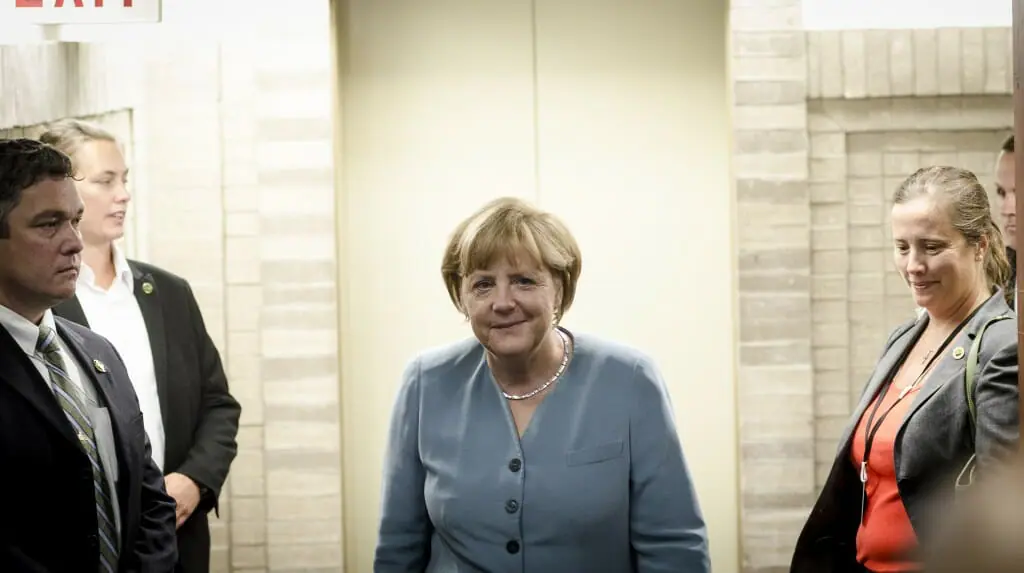
By Calum Agnew, News Editor and Simcha Walfish, Staff Contributor
The most powerful woman in the world (according to Forbes) visited Dal on Thursday. She’s a quantum chemist – and also the Chancellor of Germany.
For a change, the German Chancellor Angela Merkel’s visit to Halifax wasn’t to discuss economics. After two days spent hashing out a possible free trade agreement with Prime Minister Stephen Harper, Dal was second and final stop on Merkel’s two-day trip to Canada.
The German chancellor examined maritime research projects at Dal, and observed the signing of a Memorandum of Understanding (MOU) between the Halifax Marine Research Institute (HMRI), hosted by Dal, and the Helmholtz Association, the largest scientific research organisation in Germany.
HMRI is a consortium of businesses, universities, and governmental and non-governmental partners.
Dalhousie’s relationship with German scientists is has been flourishing for years. On the same day as Merkel’s visit, Nature, one of the leading scientific journals, published a paper Dalhousie biologists Douglas Wallace and Julie LaRoche, who previously lived in Germany.
“We’re already doing what the memorandum says should be done,” says Dr. Boris Worm, a Dalhousie marine biologist working on global climate change. “But it legitimizes it, in a sense. We hope that similar projects will find it easier to be funded in the future.” Dr. Worm is himself a German; he received his PhD from the university of Kiel.
Dal graduate students, a number of whom are German, also had the opportunity to present their research to the German chancellor.
Eddie Halfyard, a 4th year biology PhD student, surgically implants electronic tags into wild Atlantic salmon, and then studies them through the Ocean Tracking Network (OTN). “Since about 1990,” says Halfyard, “we’ve seen a huge decline in the survival of salmon once they go out to the ocean. What we’re trying to see is where they die, how they die, and why they die.” The OTN consists of over 200 researchers at 68 universities, in 15 countries.
“The HMRI, OTN and the German scientists, collectively, are much stronger,” says Halfyard. “We can realize some of these lofty questions we’ve wanted to answer for a long time. We can get on the ground – and get to the answers – much sooner.”
Speaking through a translator, Merkel said that all these projected provided “the opportunity to get first hand experience on how the collaboration between our countries works.”
But even an event ostensibly about scientific research was not free of economic considerations. In addition to German-Canadian collaboration, one of the focuses of the event was public-private cooperation.
In fact, the main aim of the Halifax Maritime Research Institute is to “increase the scale, quality, internationalization, and impact of marine research, enhancing both the competitiveness of oceans industries and our knowledge base.”
At the signing of the MOU Gary Goodyear, the federal Minister of State for Science and Technology, said that both “Canada and Germany share the goal of building our economies through research and innovation.”
Local businesses seemed eager to take part. Rolls-Royce Naval Marine, which operates a factory in Dartmoth, N.S., showed the German chancellor the SeaCycler. The product of publicly funded research, the SeaCycler – a “surface piercing profiler” – enables scientists to monitor conditions under the ocean in near real-time, from anywhere in the world. Rolls-Royce hopes to sell this equipment, which costs around $1m per unit to research organizations around the world.
Other businesses at the event included Ultra Electronics, which manufactures sonars in Halifax for the German navy, and Vemco, which provides the transmitters used for projects such as the OTN.
But for her part, at the signing of the MOU and the end of her visit to Canada, Merkel brought some non-economic aspects of the Canada-Germany back into focus. It is a partnership, said Merkel, “characterized by shared values of interest, like peace, freedom, and human rights.”
“We hope this will give a boost to relations between our two countries which are already excellent, but we hope can be rendered even more excellent.”


Recent Comments